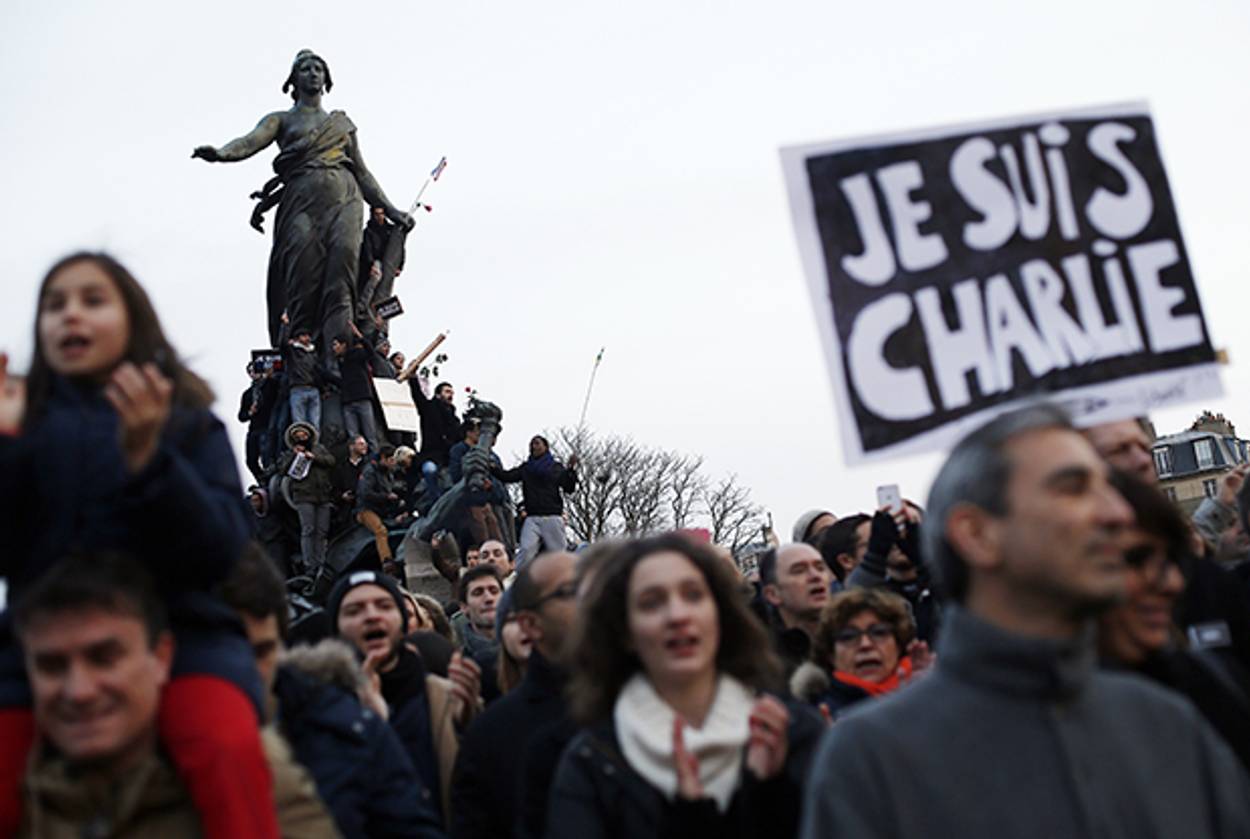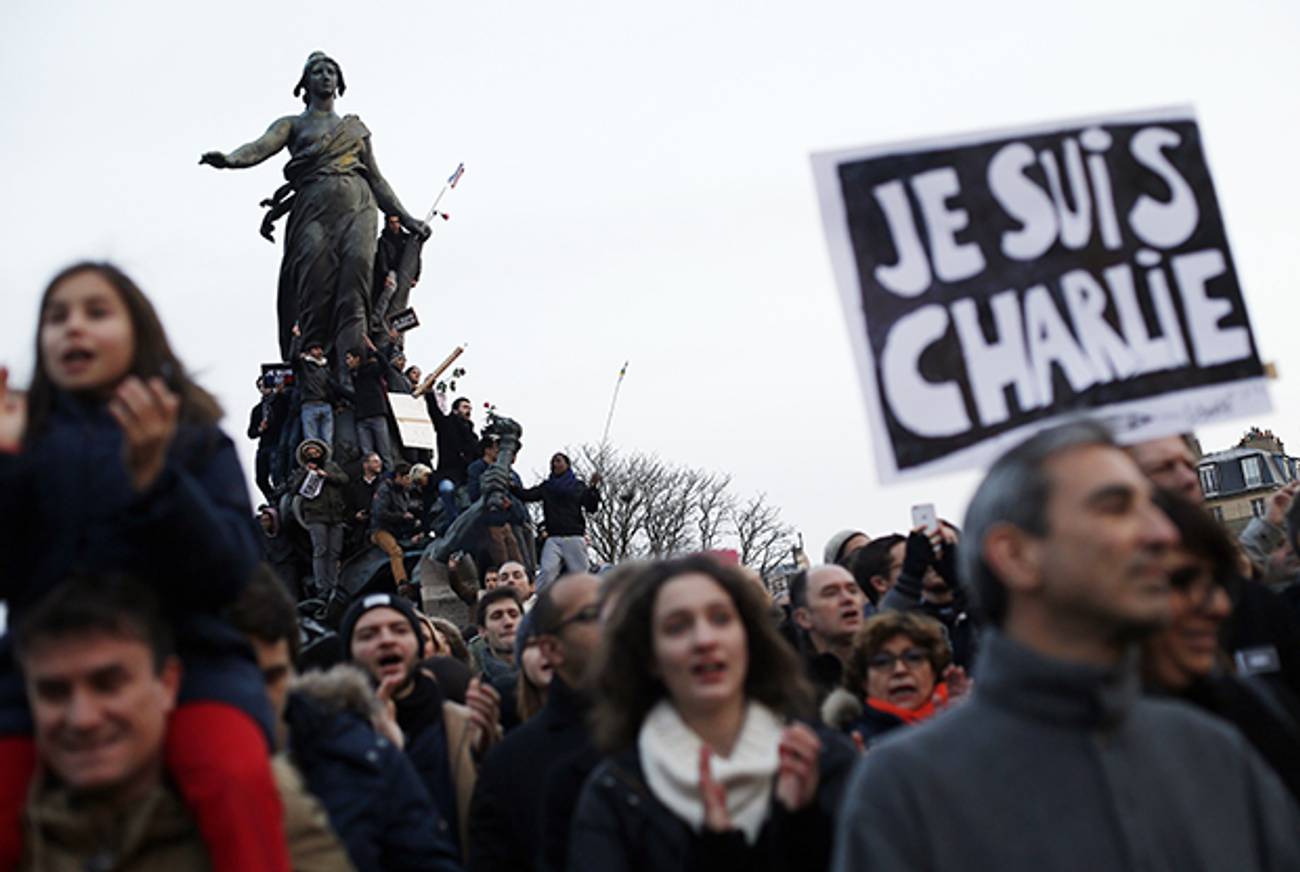The Perils of France’s Free Speech Laws
Some argue double standards are being applied in the wake of terror attacks




In the week and a half since self-declared Jidahists perpetrated massacres at the Parisian offices of Charlie Hebdo and a kosher supermarket, the relative level of the French state’s anxiety could be charted by its deployments of security personnel. An hour after hostages were taken at the Hyper Cacher, city policemen with pistols were posted at sensitive sites. This included Paris’s Grand Synagogue Notre Dame de Nazareth, which is across the street from my apartment. The next day, they were replaced by gendarmes with light submachine guns. Another day after that, the gendarmes were in turn upgraded to a van full of riot gear-clad police special response teams clutching precision carbines and sniper rifles. By the middle of last week, French defense minister Jean-Yves Le Drian announced that the army would guard every Jewish school and institution in the country. The four camouflage-clad soldiers presently passing the time by smoking outside my door grasp their FAMAS F1 assault rifles nervously. They are well trained to politely smile and greet the street’s residents courteously.
Given such a climate, it’s no surprise that the French state has retaliated with animus toward internal threats (genuine and perceived) against free speech and republican values. The arguably over-simplified terming of the massacres as ‘France’s 9/11’ was unavoidable, and the French government aroused acerbic debates by proposing a new batch of anti-terror laws modeled on the American Patriot act. This directly followed a package of laws that the National Assembly passed in late autumn. The divisions in the body politic became apparent immediately after the solidarity march, as France’s front of national unity was shattered by the realization that a substantive portion of the population did not think of itself as Charlie. A series of arrests predicated on strict anti-terrorism laws and hate speech provisions of the country’s free speech guidelines, followed by rapid trials, swiftly ensued. These have fostered questions about double standards and judicial hypocrisy as one set of norms is applied to profane political cartoonists and another to the ordinary speech—and threats—of aggrieved Muslims in purported support of the terrorists.
Around 100 cases have already been filed (concrete statistics are difficult to ascertain, as they keep changing), with myriad instances of so-called ‘fast-track custodial sentences’ being dispatched and the perpetrators jailed. Provisions in anti-terrorism laws allow for heavier sentences for Internet speech over oral speech—a side effect of the French state’s war against the rampant racism and anti-Semitism across social platforms like Twitter. Several cases have been opened against individuals who refused to observe a silent tribute to the victims of the Charlie Hebdo attacks, and the French political class has reacted with baffled furor to the widespread refusal of students in the Banlieues to respect the minute of silence.
The danger of conflating dissident speech (however unlovely) with the condoning of violent terrorism is vast when the boundaries are so poorly demarcated. A veritable cottage industry of journalistic elucidation has sprung up in the Anglosphere to explain the contorted and convoluted norms and explicate the complex thicket of exceptions that is the French free speech code. Alexander Stille aptly described the situation in The New Yorker:
“This past week, when the French school system enforced a minute of silence for the victims of the Charlie Hebdo attack (generally under “Je Suis Charlie” signs), incidents were reported at some seventy French schools—mostly ones with large Muslim populations—where students resisted the observance. While many French see this as siding with the terrorists over the victims, this is not necessarily so. The French state was, in fact, forcing those students to pay homage to a publication that had, in their view, mocked their religion. If it is legitimate for Charlie Hebdo to publish offensive cartoons, it must be legitimate to object, peacefully, to its doing so.’’
Still, the accusations that the application of the code in specific individual cases is intrinsically subjective and politicized, particularly in the wake of national tragedy, have merit. Some observers have pointed out that the persistent economic inequalities that festered in France for decades, leading to the radicalization of thousands of French youths in the first place, is mirrored by the inequality of the law’s application.
Notorious comedian and compulsive provocateur Dieudonne M’bala M’bala is the highest-profile case emerging in the past week. He faces seven years in prison—the first truly serious potential sentence of his rabble rousing career of needling the judiciary—over a Facebook post, since deleted, in which he wrote, “I feel like Charlie Coulibaly,” in reference to Hyper Cacher gunmen Amedy Coulibaly. A conviction would certainly make him the free speech martyr that he has always fancied himself to be.
To the state’s credit, those on the other side have had their right to free speech equally repressed. On Sunday, the Paris préfecture and police headquarters prohibited a planned demonstration calling for ‘Islamistes hors de France”—that is, throwing the “Islamists out of France.” The march was to have taken place at the behest of the organization Riposte Laïque (Secular Riposte) which called for the removal of “Déséquilibrés, égorgeurs, chauffards” (destabilizers, cutthroats, reckless drivers).
The French Republican tradition, which is one of a dearly earned rejection of church blasphemy laws, is in direct contradiction with the anti-pictorial injunctions and beliefs of its Muslim citizens. The law is designed to provide for the defense of criticism of ideas rather than individuals or groups—which means that while one is free to criticize an idea or concept (Islam as a religion, for example), one is liable to face prosecution if deemed to be inciting hatred against a specific group or people (Muslims or Arabs). At its prickly core, the raison d’être for the illegality of ‘incitement of crimes against race and religion’ is in France’s World War II history and concerted attempts at expunging its collaborationist sins. The doctrine of legal positivism and the prima facie distinction between a religion or ideology and its flesh and blood practitioners, though, is likely not being taught to minority teenagers living in poverty in the post industrial suburbs. If nothing else, that one of the impoverished (in every sense) and prison-radicalized gunmen behind the Charlie Hebdo massacre initially didn’t comprehend the difference between the Catholic Church and Islam in the first place tells us that the French republican model has a very serious conceptual and philosophical problem to resolve.
Previous: Politics Loom Large at Paris Solidarity Rally
Related: The New Charlie Cover
Vladislav Davidzon is Tablet’s European culture correspondent and a Ukrainian-American writer, translator, and critic. He is the Chief Editor of The Odessa Review and a Non-Resident Fellow at the Atlantic Council. He was born in Tashkent, Uzbekistan, and lives in Paris.